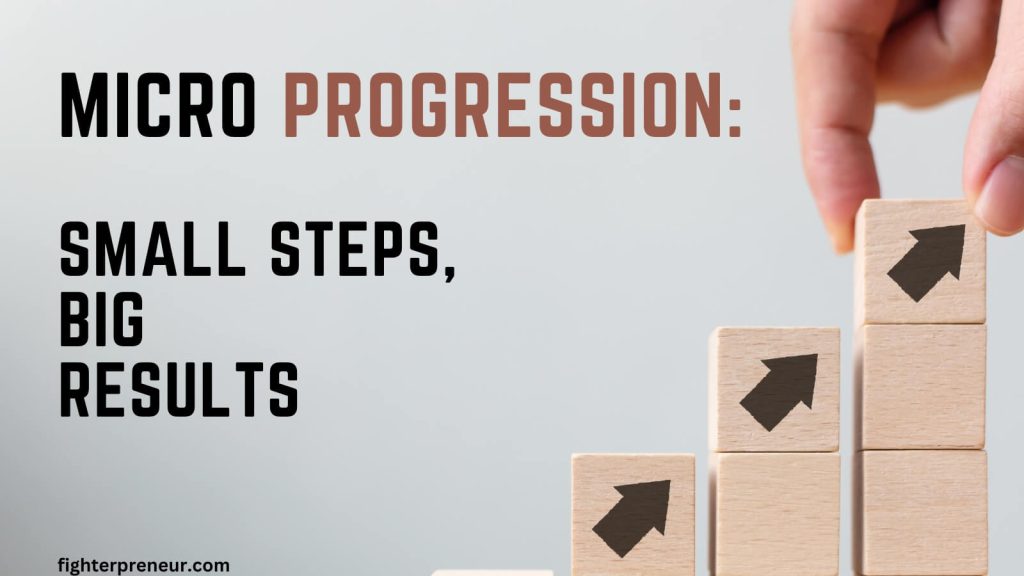
Table of Contents
Subscribe & Get Yours Goal Setting Template for 2024
Micro Progression: Small Steps to Big Changes
When it comes to achieving our goals, we often think in terms of big leaps forward. We imagine making dramatic changes in a short amount of time, transforming ourselves overnight into the person we want to be. However, this approach can be overwhelming, and it’s not always effective. In reality, most lasting change happens gradually, through a series of small steps and incremental improvements. This is the concept of micro progression.
Research shows that this approach can be highly effective. According to a study published in the Journal of Consumer Research, people who focused on making small, incremental changes were more likely to achieve their goals than those who took bigger leaps forward.
In this article, we’ll explore the science behind micro progression and why they work. We’ll also offer tips and strategies for incorporating micro-progressions into your life, so you can start making progress towards your goals, one small step at a time.
Definition of Micro Progression
Micro progression is an approach to goal-setting that involves breaking down larger goals into small, achievable steps. By focusing on small, incremental improvements, individuals can make steady progress over time, without feeling overwhelmed. The goal is to achieve lasting change through small, consistent actions.
Mindfulness is a key element of micro-progression, as it involves paying attention to the present moment and being aware of one’s thoughts and behaviors. By focusing on small, mindful steps, individuals can build momentum and achieve lasting change over time. This approach is particularly effective for those who are looking to make sustainable improvements to their health, wellbeing, or professional lives.
Micro Progression Example
One example of micro-progression is fitness. Instead of trying to achieve a huge weight loss goal or running a marathon overnight, micro-progression involves starting with small, achievable goals such as walking for 10 minutes every day, gradually increasing the time and intensity of the exercise. Micro progression in fitness is like the secret ingredient that takes your workout routine from mediocre to exceptional.
Another example of micro-progression is learning a new language. Instead of trying to learn an entire language in a short amount of time, breaking down the learning process into small, manageable steps such as learning a few new words or phrases each day can be more effective in the long run.

Micro Progression For Achieving Goals
Micro-progression is a powerful tool that can help you achieve your goals by breaking them down into small, achievable steps. Here’s how to use micro-progression to make steady progress towards your goals:
Identify your long-term goal
Whether it’s improving your fitness, learning a new language, or starting a business, you need to start with a clear long-term goal in mind.
Break it down into smaller steps
Once you’ve identified your long-term goal, break it down into smaller, more achievable steps. This will help you create a roadmap for how to achieve your goal.
Set achievable milestones
Identify milestones that you can achieve along the way. These should be small, achievable goals that help you make steady progress towards your larger goal.
Celebrate your progress
Whenever you achieve a milestone, take a moment to celebrate your progress. This will help keep you motivated and encouraged.
Using Micro Progression For Bussiness Growth
Using micro-progression for business growth is an innovative approach that can help companies achieve success without feeling overwhelmed. By breaking down larger goals into smaller, more manageable steps, businesses can make steady progress over time. It allows business owners to focus on small, incremental changes, which, when combined, can lead to significant improvements in the overall success of their businesses.
According to a study conducted by Harvard Business Review, small improvements over time can lead to significant growth in business. The study found that businesses that focused on small improvements, such as micro-progression, were more likely to see long-term growth than those who made large, sweeping changes. This demonstrates the power of small wins or micro-progression and how it can lead to significant business growth.
Start with a clear goal
Identify what you want to achieve, whether it’s increasing sales, expanding your customer base, or launching a new product. Micro Progression for Small businesses will help you achieve your business goal!
Break it down
Once you’ve identified your goal, break it down into smaller steps. For example, if you want to increase sales, you might start by focusing on improving your marketing efforts, or reaching out to existing customers for feedback.
Set achievable milestones
Identify small, achievable milestones that you can reach along the way. This will help you stay motivated and make steady progress towards your larger goal.
Track your progress
Keep track of your progress over time, whether it’s through sales figures or customer feedback. This will help you identify areas where you’re succeeding and areas where you need to make adjustments.
Micro Progression in MMA

Micro-progression is a concept that is increasingly being used in the world of MMA training. Rather than focusing on making big leaps in skill development, many coaches and athletes are breaking down training into smaller, more achievable steps. This helps to create a sense of progression, as athletes can see improvements in their skills over time.
Some examples of micro-progression in MMA include:
Breaking down techniques into smaller components
Rather than focusing on learning an entire technique at once, athletes can break it down into smaller steps, such as footwork or hand placement.
Setting achievable sparring goals
Rather than going all-out in every sparring session, athletes can set achievable goals for each session, such as working on a particular aspect of their game.
Tracking progress over time
By keeping track of their progress over time, athletes can see the improvements they’re making, which can be highly motivating.
The Science Behind Micro-Progressions: Why Small Steps Lead to Big Changes
When we achieve big things by taking small steps, it can be attributed to the way our brain works. Our brain is wired to seek out rewards and positive feedback, which is why breaking down larger goals into smaller, achievable steps can be effective in keeping us motivated and encouraged.
Taking small steps towards a goal triggers the release of dopamine, a neurotransmitter associated with pleasure and reward. Each small step we take towards our goal provides a small hit of dopamine, which reinforces the behavior and encourages us to continue working towards our goal.
Research has shown that creating a plan and breaking down larger goals into smaller steps can also reduce anxiety and stress. When we focus solely on a large, daunting goal, we can become overwhelmed and anxious about the outcome. Breaking it down into smaller steps helps to reduce this anxiety and can make the task feel more manageable.
The science behind micro-progression has been extensively researched, and the evidence supports the effectiveness of this approach.
One study conducted by the University of California found that breaking a large goal down into small steps not only increases motivation but also helps to build self-efficacy, (source of this study). Another study published in the Journal of Consumer Research found that individuals who focused on making small changes to their behavior were more likely to achieve their goals than those who tried to make large, drastic changes.
Additionally, research published in the Journal of Applied Psychology has shown that micro-progression can lead to a positive feedback loop, in which small successes reinforce positive behaviors and lead to more significant accomplishments.
Overall, these studies show that the science behind micro-progression is sound, and small steps can lead to significant changes over time. By breaking down larger goals into smaller, more manageable tasks, individuals can build momentum, increase self-efficacy, and ultimately achieve their goals.

